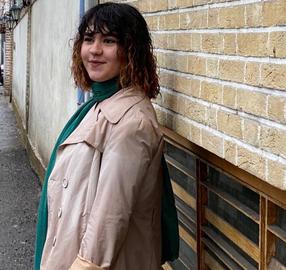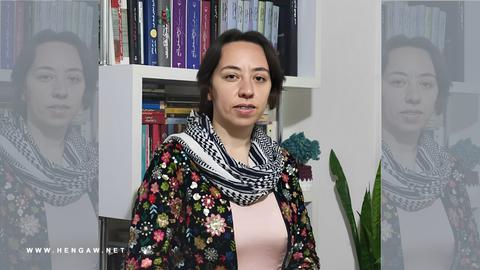Iran’s parliamentary elections on February 26 have been read as a victory for women MPs, with several new female candidates winning seats. They include reformist Parvaneh Salahshoori and 30-year-old business graduate Fatemeh Hosseini. At the same time, several female politicians, many of them affiliated with Iran’s more conservative political camps, lost their seats, including Fatemah Alia, who supported a ban on women attending sports events in stadiums. Iranian women’s rights activists say support for such legislation lost many MPs their seats.
Sakineh Omrani, who represented the city of Semirom in Isfahan province, is among those who lost seats. I spoke to her about the claim that female MPs did not champion policies that would benefit women, and about why so many women MPs lost seats.
What do you think are the most important issues for women today?
The most important demand that women around the world have is to be valued as members of society and to not be treated as merchandise.
Unfortunately, in the Western world, and in the world of commerce and advertisement, women have been treated as a tool to attract customers. Women have been distanced from piety, and from their role as independent human beings who can reach perfection. Instead, they are viewed from a commercial angle. In Islam, a woman is a valuable human being who can reach perfection, and many verses in the Koran hold women in high esteem. This is the exact opposite of the ignorant, non-Islamic, Western view. This ignorance — this practice of neglecting divine guidance — did exist at the time of the Prophet, and now we are experiencing a second wave of ignorance about women.
Islam is totally against the view that women can be equated with merchandise. Anybody who is familiar with Islam and knows the religious tenets of Islam undoubtedly knows about Islam’s high regard for women, and about what is most important to women. Women’s most important demand is to be viewed properly by society. It is only Islam and an Islamic society that can satisfy this inner need in women.
But in this same religious society, the MP Nader Ghazipour recently said many offensive things about women — and many women were upset.
We condemn those statements, and we are at a complete loss as to how Ghazipour could say them. His comments were unfair, unconscionable and untrue. It is inappropriate for anyone to make such remarks, but it is worse when a member of parliament makes them. Parliament is a dignified institution.
No matter why he said such things — whether he believes in them or it was more about the political atmosphere of the time — they were very inappropriate and he must be held accountable. We women of the Ninth [current] Parliament have taken legal action against him, without causing uproar in parliament.
Parliament is a holy place, and I am sure such statements have never been heard during any parliamentary session.
I was there. I know the spiritual strength and values of women members. For women MPs serving in the Ninth Parliament, I can say with certainty that parliament was essentially like a mosque for us. We performed ablution before we entered the chambers, and we began parliamentary sessions with recitations from the Koran. We were very careful about wearing proper hijab, and careful with our tone of voice, so that we could not be criticized — God forbid — for our behavior. I am confident that, even when it came to voting, women MPs tried to leave political considerations aside. We had our conscience and God as our judges.
Women’s and civil rights activists have repeatedly argued that women MPs have voted for anti-women legislation. What is your view?
Unfortunately, newspapers belonging to a certain [political] spectrum were not happy with the decisions taken on women’s affairs, so they launched a propaganda campaign against these MPs. They gave a false impression of women MPs.
But what about the legislation to enforce gender segregation in city government offices, or the move to ban women from watching volleyball matches in stadiums? Many female MPs supported these policies.
We did not introduce a bill for gender segregation. It was a policy implemented by the office of Tehran’s mayor. But we did agree that sexual segregation would create a better working environment.
In the case of volleyball spectators, we pointed out that the stadium atmosphere was too volatile, so it would be better if a section could be reserved for women. That way they could watch the game without going through the excited crowds — but that until that happened, it would not be prudent for women to attend. Besides, the general public does not make the issue of watching volleyball a priority. This was a demand from a specific group — so it cannot be considered to be anti-women.
We helped women in many areas. For example, we proposed that women in particular circumstances should receive full pay if they have to reduce their working hours. This was very helpful, because it means women can work outside the home and help their families financially, while at the same time have more opportunities to manage affairs at home. The examples you cited were propaganda that was meant to do damage. The women of the Ninth Parliament were, and are not, anti-women.
In the February 26 parliamentary elections, most women MPs did not get re-elected, including you. How do you explain this?
The representatives for small towns spend most of their time pursuing development projects, regardless of whether they are men or women, because that is what their districts want. An MP’s duties and responsibilities are not very clear to people living in these towns. It could be that the organizations responsible for development are weak and don’t manage the affairs of their people very well. The people may pin their hopes on these MPs, but then they feel let down because these development organizations aren’t as well run as they should be.
In some small towns, people see their representative as a savior, and they appeal to them even for the most basic things. These MPs have a difficult, time-consuming job. Most representatives do not get re-elected for a second term. People expect every one of their demands to be pursued, but this is not possible. One person cannot pursue the personal demands of several hundred thousand people. For example, in some places, when a public works project has been completed, one person will come forward and say: “How does this benefit me personally?” Most people vote based on their personal expectations, and this makes it impossible.
Related Articles:
"Jackasses, children and women should not be allowed in parliament!"
How Iran's Laws Discriminate Against Women
Women in Stadiums: The Ban Continues — Except for a Select Few
visit the accountability section
In this section of Iran Wire, you can contact the officials and launch your campaign for various problems
























comments